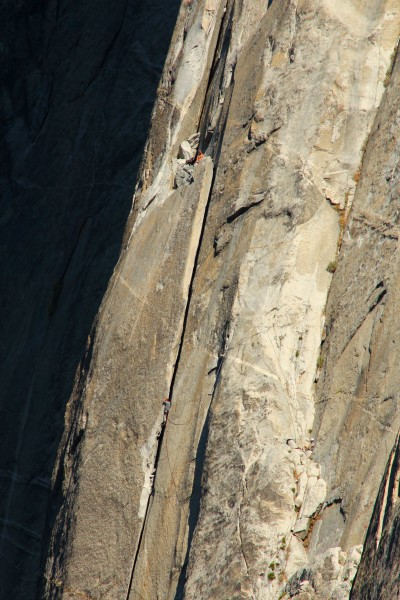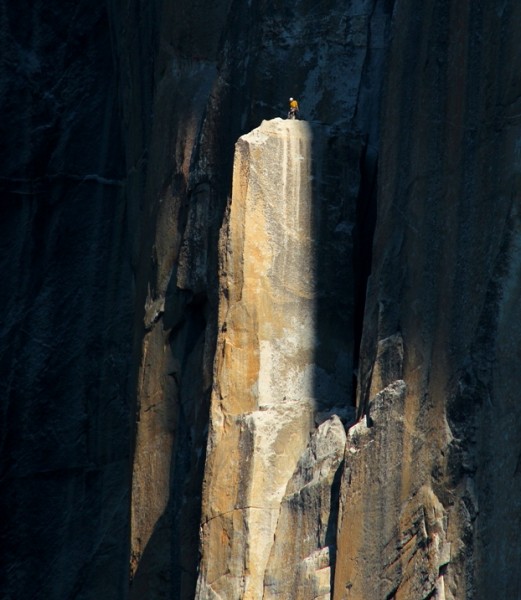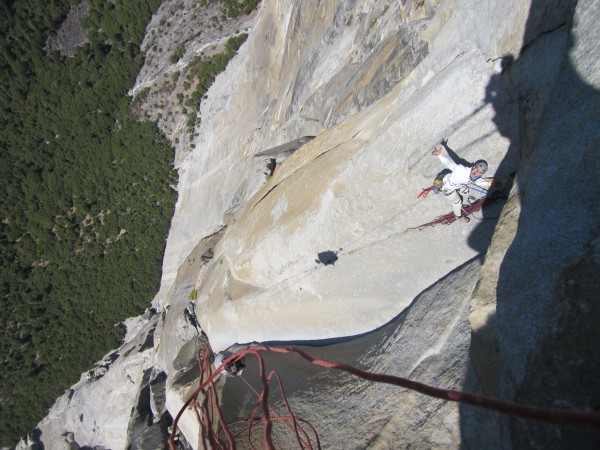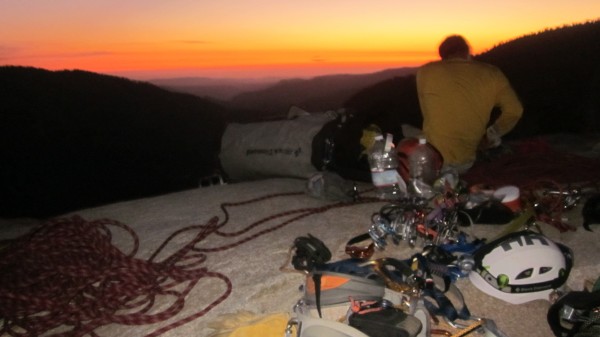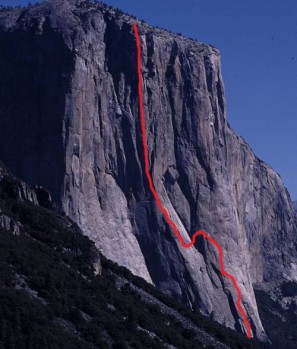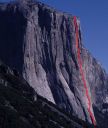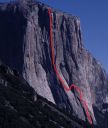I wrote this a couple months ago, and printed it out for my family to read over the holidays. Figured I'd post it up.
It’s amazing that climbing El Capitan in Yosemite is no big deal for a lot of people: routes that originally took parties days, even months to climb, can be done in just a few hours by elite climbers. For yours truly and my partner Dave Ahrens climbing El Capitan was a big deal, a life goal that would take all the knowledge we had about climbing, and then some.
Before the stone is touched the climb is a dream. Dave and I had talked on the phone for months prior, finalizing details of how to borrow aid gear, who was going to buy offset nuts and cams, and where we could get our hands on a poop tube. We had all the details down, and we both openly expressed our nervousness. Neither of us are aid climbers, and this would be the crowning achievement for our climbing careers. We were ‘just a couple guys from Colorado’ testing our mettle on The Big Stone. Here’s some highlights from the most memorable pitches:
Pitch 1: We decide to hop on El Cap our first morning after arriving to Yosemite thinking that we won’t spend too much time staring at the monolith, and therefore won’t be able to talk ourselves out of it. We arrive at the base of the route at the same time as another party. We converse diplomatically; they are working a free variation to the route, Freerider, and insist we go ahead of them; knowing we will be slower we insist they go ahead. A refreshing start and a good omen that we’ll share belay ledges with these friendly, strong climbers.
Pitch 11: We’ve successfully climbed the first part of the wall, The Freeblast, and everything goes smoothly. Dave takes a decent fall (about 15 feet) on the crux slab pitch, but all is well. We leave our rack of cams, nuts, and slings at Heart Ledges where we will haul all our gear up to the following day. We rappel fix ropes back to the ground, and just like that we are committed to the route.
Hauling is difficult, exhausting and frustrating like it always is. We haul to Heart Ledges efficiently though, and bask in the glory of a comfortable ledge. There is free water left by another party, that we help ourselves to. We lead one pitch from Heart Ledges, and then fall asleep with the cosmos, happy to be on the rock of our dreams, El Cap.
Pitch 13, The Hollow Flake. Of all the pitches on the route I was the most nervous about this one, an off-width that you have to pendulum into, and supposedly had little protection from falls. It was the hardest pitch, most emotional pitch of the route without a doubt. I swung over into the off-width, climbed up with my left shoulder in the crack, and my left hoot in the heel-toe formation. Soon I wondered if it would be better if I was facing the other way so I down climbed and put the right side of my body in. The whole time I was trying to keep my #6 camalot in the crack, the only piece of gear keeping me from a massive fall. Finally I realized left side in was the way to go, and I kept inching upwards, with prayer that I wouldn’t fall. Fifty feet up now the crack was bigger which makes the #6 useless, but by then I had the entire left side of my body in the crack, and both of my feet were heel-toeing. I kept looking up to the anchors, my savior of life. When I reached them I felt a wave of relief and happiness as I looked down to the Hollow Flake, and put it into my bank of scary climbing memories.
Pitch 19: We climb into the darkness to reach our bivouac. Dave aids an off-width crack to an oasis called The Alcove, where the climbers we met at pitch one are staying. Luckily they have a portaledge, and there is room for the two of us to comfortably sleep. Exhausted, we talk with our new friends; they have been successful thus far and have free climbed every pitch. We are happy for them, and they are stoked for us; the true spirit of rock climbing is evident, and we realize we are more than halfway up the climb of our dreams!
Pitch 20: Dave is a great climbing partner because we are so similar in so many ways. We are exhausted in the morning, so we’re lazy and drink coffee; a favorite pastime we share. We have food and water for four days, so we decide to take it easy and not rush the climb. Our lazy morning in the vertical is rewarded with this shot that Tom Evans took from below, with Dave at the El Cap Spire in the perfect light.
Pitch 23: Dave leads up a pitch known as The Sewer, labeled as the worst pitch of the route on the topo. In late September though The Sewer is completely dry, and the climbing is enjoyable. We thank the heavens for our luck, and climb up to our bivy for the night, at The Block, an uncomfortable place to be, as it is a sloping ledge not really suited for sleeping, but beggars can’t be choosers.
Pitch 29: The Salathe Headwall is an unforgettable place to be. Our haulbag is feeling light, and we are near the top of the wall. The trees below are tiny specks, and the exposure puts a knot in my stomach. The pitch is relatively straightforward with excellent gear placements. I am climbing on my last energy reserves, and we are relieved the summit is near.
Pitch 31: Exhausted and dehydrated there is still more climbing, it feels like this route will never end. As I embark on this lead Dave makes a remark about our dear friend Adam Lawton, who died in an avalanche earlier in the year, and how he would be proud of us. Soon after he says that I come across a fixed pink tri-cam, which was a piece of gear Adam carried with him everywhere. For me it is a divine sign, and I feel his presence with us near the top of El Cap. Though I am exhausted and have a headache from dehydration I feel sublime.
Pitch 35: Dave leads us to the summit. The sunset is unreal, deep fire red and orange, the sunset of a climber’s dreams. We hoot and holler like we have been unchained from El Capitan, which we have. Somehow Dave digs up two packages of tuna from the haulbag, which taste better than tuna ever has or ever will. I think of the people closest to me, my friends and family, and I couldn’t be happier to be alive and on the top of El Cap with my homey Dave. We have a restless night of sleep on top, and walk down in the morning. When we get back to the car the climb seems surreal, and we bask in the relief of what we have done.
Luke Mehall is the publisher of
The Climbing Zine.
